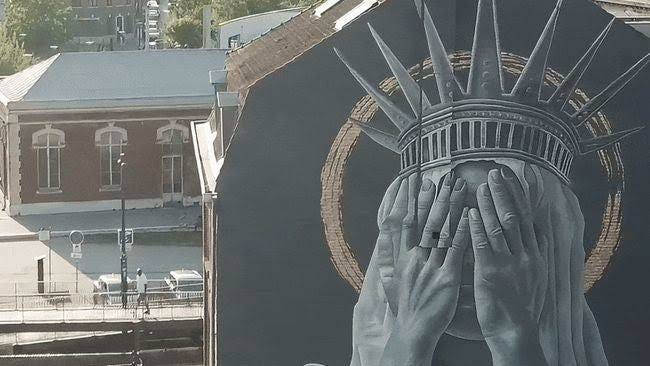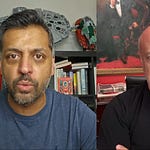This was a sobering Fourth of July. We witnessed a President sign into law a budget that will dramatically harm our great American project. We will be a much poorer, more indebted, sicker, and less free nation as a result.
But as deflating as this moment may seem, I want to offer some perspective.
Every generation of Americans has been summoned to defend the promise of democracy. Some have stood in snow-covered camps with no shoes and no certainty of survival. Others have crossed oceans into fire, fighting for freedom not only for themselves but for the world. Some marched in the Deep South against the racist laws that have scarred us since our founding. And some have stood their ground at home, marching, organizing, speaking up, so that our institutions might endure and our ideals might live.
Now, it is our turn.
There is a growing temptation to believe that our moment is uniquely dire, that democracy itself stands on a knife's edge, unlike anything we have seen before. It's true: cynicism is thick in the air. We have a president who has dismissed the rule of law, promised retribution, and now holds the lives of thousands of vulnerable people in his hands. Statehouses echo with extremism. And our national discourse often feels like a slow-motion landslide toward something darker than division, something like despair.
But perspective matters.
In the brutal winter of 1776, after a string of humiliating defeats and the collapse of morale in the Continental Army, General George Washington addressed his ragged troops. The British had routed American forces in New York. Desertion was rampant. Congress had fled Philadelphia. Most enlistments were due to expire on New Year's Eve, and the revolution was close to dying. The cause seemed hopeless, much as democratic norms can seem fragile today when institutions face relentless attack and public trust erodes.
But Washington, with no grand oration, no flourish, simply told them:
"If you will stay but one month longer, you will render that service to the cause of liberty and to your country which you probably can never do under any other circumstances."
Washington understood what we must remember now: that pivotal moments in history often look like defeats until someone chooses to persevere. His appeal wasn't to glory or victory, but to the unique responsibility of their generation, just as we face our own unrepeatable moment to defend democratic principles.
Not all of them stayed, but enough did. You and I are here today because they did.
Those who did stay remained not for pay, not for comfort, but because they understood something elemental: liberty is not self-sustaining. It demands sacrifice. And that generation, shoeless, starving, and vastly outnumbered, saved the American experiment in its infancy.
Eighty-seven years later, in the midst of a war that tore the nation in half, President Abraham Lincoln stood on a battlefield littered with the fallen and spoke just 272 words that still echo. The Battle of Gettysburg claimed over 50,000 casualties in three days. The Union itself seemed on the verge of collapse, with states in open rebellion and the very concept of American democracy under existential threat. Critics called Lincoln a tyrant; newspapers demanded his resignation; even his own party questioned his leadership. The parallels to our polarized moment are unmistakable: when truth itself becomes partisan, when fellow citizens view each other as enemies, when the legitimacy of democratic institutions hangs in the balance.
Yet Lincoln chose not to dwell on division but on dedication:
"It is for us the living... to be dedicated here to the unfinished work which they who fought here have thus far so nobly advanced... that government of the people, by the people, for the people shall not perish from the earth."
Lincoln didn't glorify war. He glorified endurance. He reminded Americans that democracy was not some divine inheritance, but a fragile thing, always at risk of perishing, always in need of defenders.
Not all Americans heeded Lincoln's call, but enough did. We are here today because of them.
And then again, in 1944, as tyranny rose like a storm cloud across Europe, General Dwight D. Eisenhower sent a message to the Allied troops who would storm the beaches of Normandy. Democracy had been crushed across much of the continent. Fascist movements had exploited economic desperation and political polarization to seize power, promising simple solutions to complex problems while demonizing scapegoats and dismantling democratic institutions piece by piece. The techniques of authoritarian control that we've become familiar with here at home, propaganda, the weaponization of grievance, and the systematic erosion of truth, feel disturbingly familiar in our age of disinformation and political extremism.
Eisenhower understood that the fight for democracy often comes down to ordinary people willing to take extraordinary risks at pivotal moments:
"The eyes of the world are upon you. The hopes and prayers of liberty-loving people everywhere march with you."
We are here today because enough men ran into a hailstorm of hellfire to secure freedom for us.
Our moment may not look like Valley Forge, Gettysburg, or Omaha Beach. We are not dodging bullets or charging trenches.
We are blessed at this moment not to have to send our sons and daughters off to foreign lands to die for the cause with which we're now entrusted.
American men, likely far younger than those reading this, met the moment of history's call, giving the ultimate measure in places known and unknown to them. Belleau Wood. The Mekong Delta. Guadalcanal. Fallujah. Gettysburg. Bunker Hill. Antietam. Iwo Jima. Normandy. Peleliu. Inchon.
None of us is currently called to make a fraction of their sacrifice. Every one of them knew fear. Every one of them used it to fuel the fight for their rights and the rights of others.
But make no mistake, we too are in a war for democracy. It is a different kind of battle, fought not with muskets and bayonets, but with ballots and truth, with civic engagement and institutional defense. The stakes, while less visible than physical combat, are no less meaningful. If we fail to engage, if we lose faith in truth or drift into apathy, the American project, the promise that people can govern themselves, will erode from within. This bloodless war may be quieter than its predecessors, but defeat for our freedoms and our Constitution would be no less final.
Let us be clear-eyed: we are not asked to cross icy rivers or charge into enemy fire. We are asked to vote, to speak, to organize, to protest, to resist authoritarianism not with muskets or tanks, but with conviction and clarity. It is not glory we are called to, but responsibility.
To believe that our time is uniquely cursed is a form of arrogance. We are heirs to people who endured far worse and prevailed. But to believe that democracy will survive without our effort is a form of delusion.
This nation has survived civil war, global war, economic collapse, racial injustice, and constitutional crisis. It has done so not by accident, but because enough people, sometimes just barely enough, rose to the challenge.
We must do the same.
This is a moment of choosing. Between fact and fiction. Between hope and fear. Between democracy and something much colder.
Let us be worthy of the moment. Let us honor Washington's quiet plea for courage, Lincoln's call to finish the work, and Eisenhower's faith in ordinary people to do extraordinary things.
Today, fear has gripped millions of Americans, but the moment must be met with catalyzing action, not paralysis. Turn fear into righteous anger. Do not let it leave you frozen.
The cause of liberty has always depended on imperfect citizens rising to perfect occasions.
Now it depends on us.













Share this post